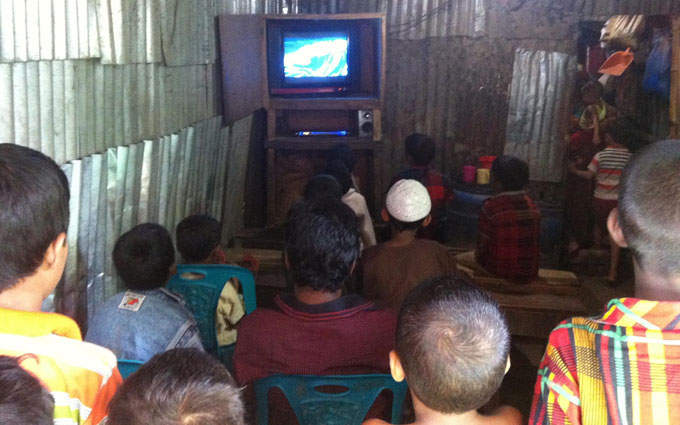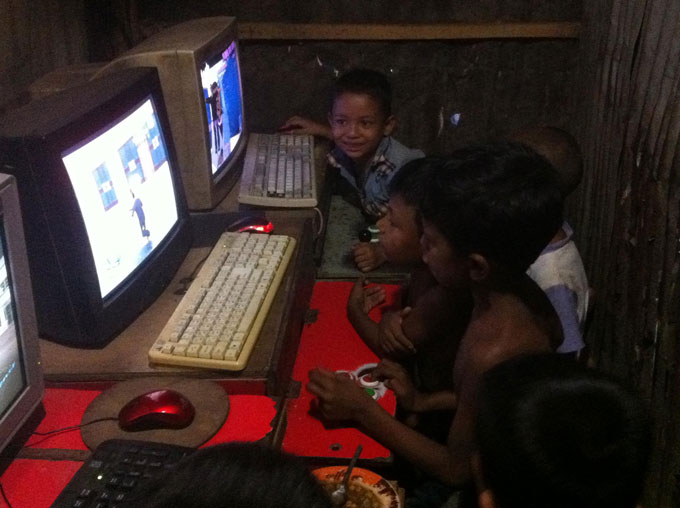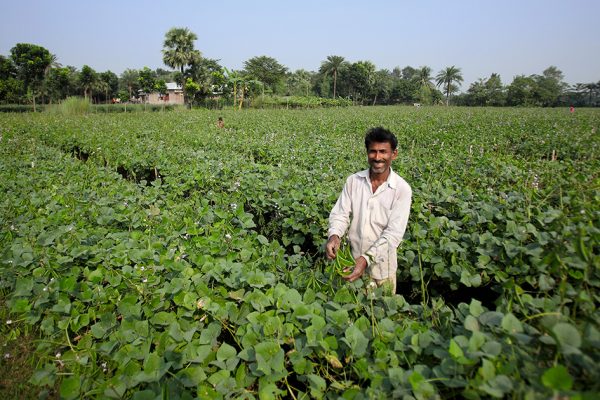The gaming boys of Dhaka slums
Reading Time: 3 minutes
Across the murky waters of Banani Lake from BRAC’s headquarters in Dhaka, Bangladesh, lies Korail, one of the country’s largest slums, jam-packed with over 40,000 people. I have always seen the slum from a distance, but knew very little about what goes on inside. Typically, slums are illegal land settlements littered with crime, invariable health-hazards and acute poverty. But what I saw recently on my first visit was beyond my expectations.

Children of all ages watch Doraemon together in the tin-shed clubhouse set up by a microfinance client.
Across the murky waters of Banani Lake from BRAC’s headquarters in Dhaka, Bangladesh, lies Korail, one of the country’s largest slums, jam-packed with over 40,000 people. I have always seen the slum from a distance, but knew very little about what goes on inside. Typically, slums are illegal land settlements littered with crime, invariable health-hazards and acute poverty. But what I saw recently on my first visit was beyond my expectations.
Situated among the overcrowded tin-sheds was one particular shop that caught my attention. Inside, boys and girls of all ages were sitting together and watching Doraemon on television. When I approached the shopkeeper, she said she was a BRAC microloan borrower and that her business was for children who needed a place to go before and after school. “Many of them are locked out of their homes while their parents are at work,” she explained. “So they can come here, eat some chat pati [savoury chickpea and potato snack] and keep themselves entertained.” To my amazement, the shopkeeper even had a DVD player. I was even more surprised to find a group of boys crammed into a narrow backroom, sitting in front of three computers. My jaw dropped when I realised they were playing Grand Theft Auto, a British 3D action-adventure video game.
“How many people have you shot today?” I asked one of the little ones. He was so focused on the game he didn’t even bother looking up.
“About 100,” he replied stoically.
There was something about the paradox of the scenario that hit close to my heart. While they were children playing video games, albeit about machine guns and carjacking, they weren’t just any children. They were kids using computers in the depths of Dhaka’s largest slum. Sure they are being exposed to violence, but let’s look at the bigger picture – they were being given the opportunity to use computers, which can later translate into vocational skills.
BRAC believes in empowering the poor to realise their own potential, and rise out of poverty through their own efforts. Tools like microfinance are a huge component of BRAC’s holistic approach. But business ideas like these informal day care centres are driven by the borrowers themselves. This particular borrower is a mother and understands the needs of youth in her neighbourhood. She uses her informal day-care venture to generate an income while providing children refuge outside their homes and school. She doesn’t charge them for watching cartoons or playing video games, she makes money by selling snacks for about 10 or 20 BDT (13 to 26 cents USD).
There’s no doubt that media and technology can be an excellent entertainer and educator. In the West, parents often worry that too much television can interfere with physical activities, or doing homework. However, in moderation, technology can catalyse thinking beyond the tin walls of Korail. Slum kids can learn a lot from watching cartoons like speaking English. Combining what they learn in schools and any basic computer skills they pick up will also help them obtain jobs in the future. So while they spend hours playing video games, they empower themselves with technological savvy.
A few months ago, BRAC’s Social Innovation Lab published a map of Korail, which indicates five existing NGO-run day-care centres in the slum. But before I left, I noticed one more informal day-care like the first belonging to another microloan borrower. Micro-entrepreneurs in Korail are clearly capitalising on the need to look after children. But the beauty of this sustainable slum-grown model is that the children will also benefit from the long-term social impact of being allowed to play in a safe space. As I began my boat journey back across the lake, I found myself feeling pleased about discovering this microfinance-supported clubhouse. I couldn’t wait to go back to the office and tell everyone what I witnessed.
I wasn’t only amused by these little kids rapt by the world of virtual carjacking, but also deeply touched. For a moment, the degree of separation between us felt smaller. They weren’t any different from my own nephews and nieces who react the same way when approached while playing video games. What I learned that day is that all children are the same when given the same opportunities. With access to more tools, the degree of separation can close further, and these gaming boys of Korail can realise their potential beyond the slums along Banani Lake.

Crammed into a narrow backroom, the gaming boys of Korail play a British 3D video game while eating chat pati.
Anushka Zafar is a senior communications officer and sub-editor at BRAC.





